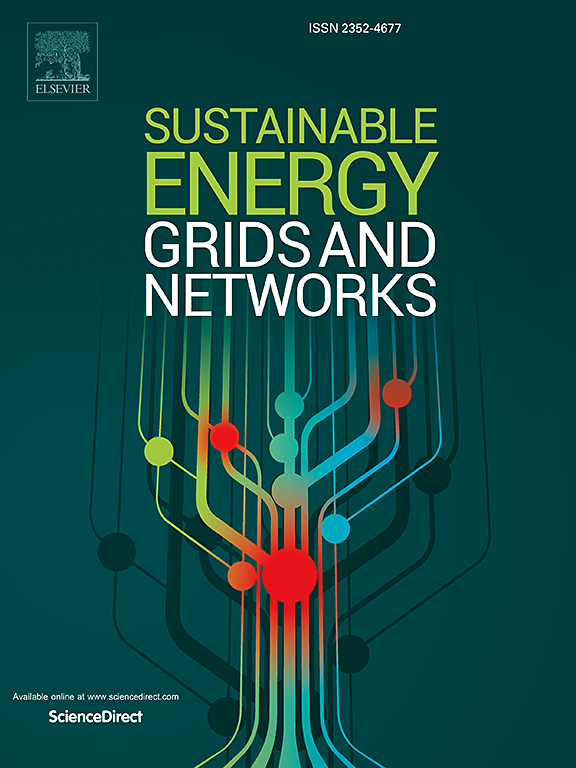Energy management in smart homes with adversary detection and noise mitigation using a moving prediction window scheme
IF 4.8
2区 工程技术
Q2 ENERGY & FUELS
引用次数: 0
Abstract
This paper presents an energy management algorithm for scheduling a large number of residential households, utilizing the moving prediction window to make it resilient against false data injection attacks and communication noise. We model multiple communities of smart homes, each managed by a local controller, where self-interested residential households engage in a global non-cooperative game. The cost functions of the households are influenced by a constrained aggregated power consumption term across all households from all communities. The interactions among households are modeled through a multi-community aggregative game. To reach a Nash equilibrium, we propose an iterative algorithm wherein local controllers estimate the coupling aggregate term and corresponding Lagrange multiplier for their respective households and collaborate with other controllers via an unreliable communication network to refine the aggregate estimations. Given the vulnerability of the communication network to external intrusions and the potential for internal controllers to behave maliciously, we explore a moving horizon window technique to detect false data injection attacks and mitigate communication noise. In this regard, first, a moving horizon estimator predicts the community’s current behavior based on historical data; second, a residual-based detection mechanism flags an attack when predicted residuals exceed a dynamic threshold; and third, corrupted measurements are discarded, and the average of the predictions is used in the Krasnoselskii-Mann update to reduce the noise impact. Numerical simulations show the effectiveness of the proposed algorithm in increasing the speed of reaching consensus by about 30 percent while managing the energy consumption of households.
智能家居中的能源管理,使用移动预测窗口方案进行对手检测和噪声缓解
本文提出了一种用于调度大量居民家庭的能源管理算法,利用移动预测窗口使其具有抗虚假数据注入攻击和通信噪声的弹性。我们模拟了多个智能家居社区,每个社区由一个本地控制器管理,其中自利的住宅家庭参与全球非合作博弈。家庭的成本函数受到来自所有社区的所有家庭的受限的总电力消耗项的影响。家庭之间的互动是通过多社区聚集博弈来建模的。为了达到纳什均衡,我们提出了一种迭代算法,其中局部控制器估计各自家庭的耦合聚合项和相应的拉格朗日乘数,并通过不可靠的通信网络与其他控制器协作以改进聚合估计。鉴于通信网络对外部入侵的脆弱性以及内部控制器恶意行为的可能性,我们探索了一种移动地平线窗口技术来检测虚假数据注入攻击并减轻通信噪声。在这方面,首先,移动视界估计器根据历史数据预测社区的当前行为;其次,当预测残差超过动态阈值时,基于残差的检测机制标记攻击;第三,丢弃损坏的测量,并在Krasnoselskii-Mann更新中使用预测的平均值来减少噪声影响。数值模拟表明,该算法在管理家庭能源消耗的同时,将达成共识的速度提高了约30%。
本文章由计算机程序翻译,如有差异,请以英文原文为准。
求助全文
约1分钟内获得全文
求助全文
来源期刊

Sustainable Energy Grids & Networks
Energy-Energy Engineering and Power Technology
CiteScore
7.90
自引率
13.00%
发文量
206
审稿时长
49 days
期刊介绍:
Sustainable Energy, Grids and Networks (SEGAN)is an international peer-reviewed publication for theoretical and applied research dealing with energy, information grids and power networks, including smart grids from super to micro grid scales. SEGAN welcomes papers describing fundamental advances in mathematical, statistical or computational methods with application to power and energy systems, as well as papers on applications, computation and modeling in the areas of electrical and energy systems with coupled information and communication technologies.
 求助内容:
求助内容: 应助结果提醒方式:
应助结果提醒方式:


